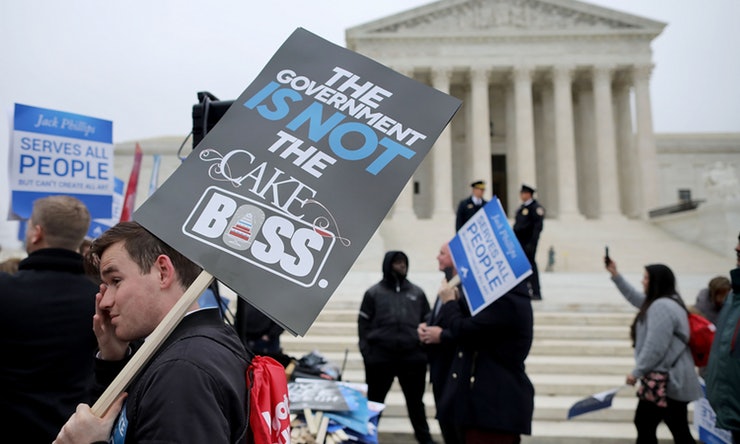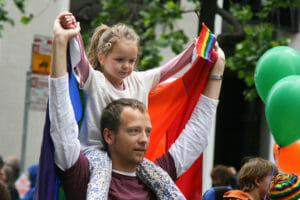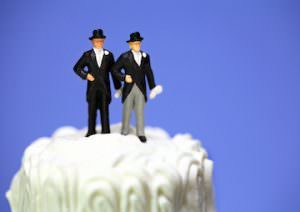Masterpiece Cake Case Could Affect Women’s Rights
The National Women's Law Center files a brief in the Supreme Court case involving a Colorado baker who refused to make a wedding cake for a same-sex couple. Chip Somodevilla / Getty Images
Chip Somodevilla / Getty Images
The Supreme Court heard arguments Tuesday in Masterpiece Cakeshop v. Colorado Civil Rights Commission, a case concerning the owner of a Colorado bakery who refused to make a wedding cake for a same-sex couple. The subsequent legal battle has pitted First Amendment rights against anti-discrimination laws, but many women’s rights groups argue that the high court’s ruling has implications for the future of women’s rights.
The case came about when Dave Mullins and Charlie Craig walked into Masterpiece Cakeshop, a bakery in Lakewood, Colo., hoping to purchase a cake for their wedding reception. Jack Phillips, the shop’s baker, said he had no problem selling the couple his nonwedding-related pastries, but that the bakery would not make them a wedding cake.
According to the Alliance Defending Freedom, the organization representing Phillips before the Supreme Court, “As a Christian, he believes that marriage is the lifelong union of one man and one woman.” Given his faith’s “utmost importance,” the ADF says, Phillips “serves everyone, but he cannot celebrate every event.”
Colorado courts ruled that the bakery discriminated against Mullins and Craig, given a state law that stipulates that businesses open to the public can’t turn away customers based on sexual orientation. The bakery is now pursuing a “constitutional exemption,” meaning it wants permission to violate the state law based on the owner’s religious beliefs.
The American Civil Liberties Union gives insight on the legal precedent for the case:
In the 1960s, Piggie Park barbecue restaurant argued that its owner’s religious beliefs meant it could refuse to serve Black customers. In the 1970s and 1980s, schools claimed that they should be allowed to pay women less than men based on the belief that men should be the head of the household. Time and again, courts have recognized that religious views, no matter how deeply felt, don’t entitle any of us to discriminate. The same is true today. …
The Colorado anti-discrimination law doesn’t tell the bakery how to make its cakes. What it says is that if the bakery chooses to sell cakes, it can’t refuse to sell them to certain people based on their sexual orientation. The ACLU is proud to defend the First Amendment freedoms of speech and religion. But religious freedom doesn’t give anyone the right to discriminate. If it did, any business would be free to discriminate against almost any of us — members of minority faiths, women, racial minorities, LGBT people — solely based on the owner’s views.
The National Women’s Law Center, along with 39 other female-centered organizations, has filed a friend of the court brief in the Masterpiece Cakeshop case, arguing that “the Company advances a number of First Amendment defenses to discrimination on the basis of sexual orientation which, if accepted, would undermine antidiscrimination laws aimed at guaranteeing equal opportunity for full participation in our society for women.”
There are clear parallels between Masterpiece Cakeshop’s claim that homophobia warrants a privileged place under the law (so long as it’s ostensibly rooted in religious faith) and arguments historically used to justify other forms of discrimination.
Sadly, religion has often been invoked to justify racial discrimination (as the NAACP Legal Defense Fund explains in a separate brief), and women have long faced sexism stemming from the invocation of religion. Married women working at religious schools have been denied health insurance coverage because their employer believed a woman couldn’t be a “head of household,” or lost their jobs after becoming pregnant because their employer believed mothers should stay home with young children. In 1998, a religious school fired an unmarried teacher after she became pregnant — which the school explained was “clear evidence that she had engaged in coitus while unmarried.” In none of these cases did the courts accept that religion could be used to excuse sexism.
The brief from the National Women’s Law Center and other organizations also takes issue with the argument that if Phillips baked a cake for a same-sex couple, he would “tacitly” be endorsing or celebrating their union. “Commercial businesses do not — and cannot conceivably — endorse each and every customer they serve,” the brief states. It goes on to examine what a ruling in favor of the bakery might allow if extended to women’s issues:
… a restaurant owner who has a religious objection to women working outside of the home could refuse to serve a woman at a business lunch. A retail boutique owner who has a religious objection to pregnancies outside of marriage could refuse to sell clothes to a pregnant woman without a wedding ring. A hotel owner who opposes interracial marriage on religious grounds could refuse to rent a honeymoon suite to an interracial couple.
The brief also challenges the argument that Phillips should be exempt from using his skills to make the cake because the act is uniquely artistic. It argues that this underestimates the amount of creativity involved in many occupations, such as business card designers, florists and jewelers, who would also presumably be able to discriminate against women or same-sex couples if the court rules in favor of the bakery.
Justice Elena Kagan echoed the brief when the issue came up at Tuesday’s hearing, asking, “The baker is engaged in speech, but the chef is not engaged in speech?” She agreed that makeup artists, jewelers and hairstylists would potentially be free to discriminate against customers under Phillips’ lawyer’s argument.
Your support matters…Independent journalism is under threat and overshadowed by heavily funded mainstream media.
You can help level the playing field. Become a member.
Your tax-deductible contribution keeps us digging beneath the headlines to give you thought-provoking, investigative reporting and analysis that unearths what's really happening- without compromise.
Give today to support our courageous, independent journalists.


You need to be a supporter to comment.
There are currently no responses to this article.
Be the first to respond.